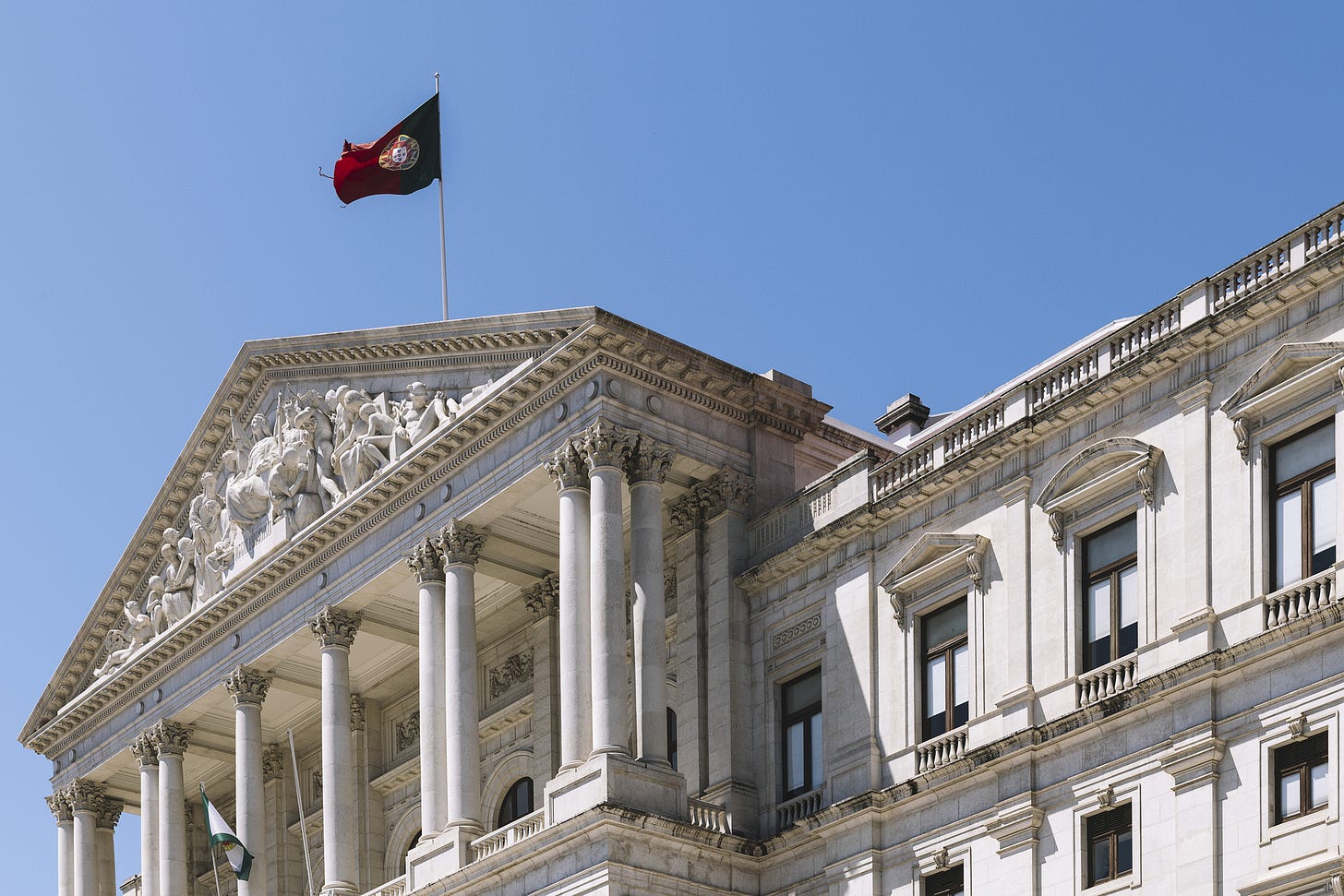The Structure of the Portuguese Government
What visitors and foreign residents in Portugal need to know.

In the United States, there will soon be an important presidential election1 - arguably the most significant election there’s been in my lifetime. A lot is at stake and the world is watching. Paul and I have been following developments closely and many of our U.S. expat friends in Portugal have been doing the same. As American citizens, we are somewhat knowledgeable on how the U.S. government works – how it is structured, the names of the political parties and what they stand for, and what the different branches of government do.
But here in Portugal, I admit, I am rather ignorant. I see billboard signs on the roads that are obviously political in nature. And I know there’s a president and a prime minister, and that the country leans towards democracy, but I really don’t know a lot about how the Portuguese government is structured. Maybe other foreign residents in Portugal have more knowledge about this, but in case you’re like me and need a high-level overview of the government in your new (or potentially new) home country; or if you’re just curious about this, I thought it would be helpful to dig a little deeper to learn more.
This article is not intended to be political in nature. The intent of this article is to help other immigrant/expats/visitors learn more about the Portuguese government and how it operates. Many of Our Portugal Journey readers are Portuguese citizens or have lived in Portugal as foreign residents for many, many years. Although I research all my articles before publishing them, if I have omitted something that would add value to the article from a learning perspective and not a political perspective, please feel free to comment or send me a message. Here is what I have learned:
Historical overview.
Portugal transitioned from authoritarian rule to a parliamentary democracy following the 1974 military coup that overthrew dictator Marcello Caetano, who had continued the long-standing dictatorship of Antonio Salazar. After a period of instability and communist influence, the country adopted a new Constitution in 1976. Subsequent constitutional amendments placed the military firmly under civilian control, reduced the president's powers, and established the foundation for a stable, pluralistic liberal democracy. These changes also led to the privatization of nationalized firms and government-controlled media. Portugal joined the European Union in 1986 and has since deepened its political and economic integration with Europe.
Currently, Portugal is a semi-presidential representative democratic republic, where the President of the Republic serves as the head of state, and the Prime Minister acts as the head of government. The Portuguese government is based on the separation of powers among the executive, legislative, and judicial branches, with each branch playing a distinct role in the governance of the country.
The Executive Branch.
The executive branch is composed of the President of the Republic, the Prime Minister, and the Council of Ministers:
President of the Republic - The President of Portugal has primarily a ceremonial role but does wield significant powers, especially in times of political instability. These powers include the ability to dissolve the Assembly of the Republic (parliament), call early elections, and veto legislation. The President also appoints the Prime Minister and the Council of Ministers, following the results of legislative elections.
The President is elected by direct popular vote for a five-year term and can serve a maximum of two consecutive terms.
Prime Minister - The Prime Minister is the head of government and is responsible for directing the activities of the government and coordinating the actions of the ministers. The Prime Minister sets government policy and oversees the implementation of laws.
The Prime Minister is appointed by the President, usually the leader of the party or coalition that has the most seats in the Assembly of the Republic.
Council of Ministers - The Council of Ministers is composed of the Prime Minister and other ministers appointed by the President on the Prime Minister's recommendation.
The Council of Ministers is responsible for managing the various sectors of public administration. Each minister oversees a particular department or portfolio, such as health, education, or defense.
The Legislative Branch.
The legislative power in Portugal is vested in a unicameral parliament, known as the Assembly of the Republic (Assembleia da República):
Assembly of the Republic - The Assembly is composed of 230 deputies, who are elected every four years through proportional representation.
The Assembly has the power to make laws, scrutinize government actions, approve budgets, and ratify treaties. It also has the authority to dismiss the government through a vote of no confidence.
The Assembly operates through various committees that focus on specific areas such as finance, health, and foreign affairs, facilitating detailed scrutiny of legislation and government actions.
The Judicial Branch
The judiciary in Portugal is independent and is tasked with ensuring the rule of law. The main judicial institutions are:
Constitutional Court (Tribunal Constitucional) -This court is responsible for ensuring that laws comply with the Portuguese Constitution. It can rule on the constitutionality of legislation, including laws passed by the Assembly of the Republic.
Supreme Court of Justice (Supremo Tribunal de Justiça) -The Supreme Court is the highest court of appeal in civil and criminal matters.
Administrative and Fiscal Courts -These courts deal with cases involving disputes between individuals and public authorities, particularly in matters of administrative and tax law.
Political Parties and Government Composition.
Portugal has a multi-party system, with several political parties participating in the governance of the country. The most prominent parties include:
Social Democratic Party (PPD/PSD) – Centre-right, liberal conservatism ideology, led by Luis Montenegro
Socialist Party (PS) – Centre-left, social democracy ideology, led by Pedro Nuno Santos
Chega (ENOUGH) (CH) – Far-right populism ideology, led by André Ventura
Liberal Initiative (IL) – Centre-right to right-wing, classical liberalism ideology, led by Rui Rocha
Left Bloc (B.E.) – Left-wing to far-left, democratic socialism ideology, led by Mariana Mortágua
Portuguese Communist Party (PCP) – Left-wing to far-left, Marxism, Leninism ideology, led by Paulo Raimondo
FREE (L) – Centre-left to left-wing, green politics ideology, led by Rui Tavares
CDS – People’s Party (CDS-PP) – Centre-right to right-wing, Christian democracy ideology, led by Nuno Melo
People Animals Nature (PAN) – Centre-left, environmentalism ideology, led by Inês Sousa Real
There are several other political parties in Portugal. This resource provides a complete list.
Current Government Composition.
The Democratic Alliance (AD), a recurring Portuguese political centre-right coalition, composed of three principal parties: PSD, CDS-PP, and the People’s Monarchist Party (PPM), won the March 10, 2024, election narrowly beating the outgoing Socialist Party (PS). The newly formed government is led by Prime Minister Luis Montenegro and governs through a minority government. With only eighty seats in the 230-member legislature, the Democratic Alliance will require backing from either the far-right Chega party, which increased its parliamentary seats to fifty, or the centre-left Socialist Party, which won seventy-eight seats, to pass legislation.
Madeira and the Azores Governments (a brief overview).
Madeira - Madeira is an autonomous region of Portugal. Located in the North Atlantic Ocean, Madeira is known for its rugged terrain, lush greenery, and rich cultural heritage. Madeira has a unique government structure that reflects both its autonomy and its ties to mainland Portugal.
Madeira gained its autonomous status in 1976, following the Carnation Revolution in Portugal, which ended the dictatorship and brought democratic reforms to the country. The Portuguese Constitution recognizes Madeira as an Autonomous Region, granting it political and administrative autonomy while remaining an integral part of Portugal. This autonomy is governed by the Statute of Autonomy of the Autonomous Region of Madeira, which outlines the powers and responsibilities of the regional government.
The Azores – The Azores is an autonomous region of Portugal and an archipelago in the Atlantic Ocean, consisting of nine volcanic islands. While the Azores are part of Portugal, they enjoy a significant degree of autonomy, particularly in areas such as governance, finance, and legislation. This autonomy is enshrined in the Portuguese Constitution and is reflected in the unique structure of the Azorean government.
The Azores, like mainland Portugal, operate under a semi-presidential representative democratic framework. The region has its own political and administrative organization, which operates independently in many aspects, yet remains integrated with the broader Portuguese state.
Who is eligible to vote in Portuguese elections?
According to this resource, people over 18 years of age are eligible to vote in Portuguese elections.
Portuguese citizens and Brazilians with equal political rights, as well as citizens from certain countries, can vote in local authority elections if they are registered in the national census. These eligible countries include:
European Union Member States (Austria, Belgium, Bulgaria, Croatia, Cyprus, Czech Republic, Denmark, Estonia, Finland, France, Germany, Greece, Hungary, Ireland, Italy, Latvia, Lithuania, Luxembourg, Malta, Netherlands, Poland, Romania, Slovakia, Slovenia, Spain, and Sweden);
United Kingdom residents in Portugal before Brexit;
Brazil (without equality status) and Cape Verde, with a valid residence permit in Portugal for over two years;
Argentina, Chile, Colombia, Iceland, Norway, New Zealand, Peru, Uruguay, and Venezuela, with a residence permit in Portugal for over three years.
Resources for further learning.
Assembleia da República – Official website of the Portuguese Parliament
Presidência da República Portuguesa - Official website of the Presidency
Government of the Azores: The official website of the Regional Government of the Azores
Regional Government of Madeira: The official website of the Regional Government of Madeira
Immigrants and the Right to Vote in Portugal
Thank you for reading Our Portugal Journey. This blog is a subscriber supported publication but has no paywall – in other words, you can subscribe for free and receive all the content. However, if you find my content valuable, please consider becoming a Supporting Subscriber for a nominal fee either on a monthly or annual basis right here. Just want to buy me a glass of wine? You can do that here.
A special Thank You to Mokeefe and to Virginia L. for supporting my work through Buy me a Coffee. I truly appreciate it!
Until next time…
Obrigada!
Carol.
Readers, family and friends often ask me if as a U.S. citizen you can vote while living abroad. The answer is yes and this resource goes into the details.



Must be good for American citizens to get a perspective of the electoral process here, which can be completed within 3 months or less, as opposed to the US process which requires about 3 years to complete. And the process here is very simple, very easy to understand, self-explanatory really. Well certaiinly when compared to the current US ridiculous and sad circus.
Thank you for this great overview. It’s very helpful to us as new expats and certainly helps us to put into better context the Portuguese political news we are reading. This article was very well constructed.